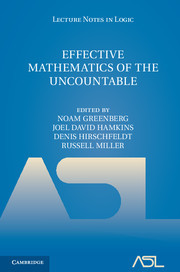Description
Effective Mathematics of the Uncountable
Lecture Notes in Logic Series
Coordinators: Greenberg Noam, Hirschfeldt Denis, Hamkins Joel David, Miller Russell
A comprehensive introduction to eight major approaches to computation on uncountable mathematical domains.
Language: English
Subject for Effective Mathematics of the Uncountable:
Publication date: 10-2013
204 p. · 15.5x23.5 cm · Hardback
204 p. · 15.5x23.5 cm · Hardback
Description
/li>Contents
/li>Biography
/li>
Classical computable model theory is most naturally concerned with countable domains. There are, however, several methods ? some old, some new ? that have extended its basic concepts to uncountable structures. Unlike in the classical case, however, no single dominant approach has emerged, and different methods reveal different aspects of the computable content of uncountable mathematics. This book contains introductions to eight major approaches to computable uncountable mathematics: descriptive set theory; infinite time Turing machines; Blum-Shub-Smale computability; Sigma-definability; computability theory on admissible ordinals; E-recursion theory; local computability; and uncountable reverse mathematics. This book provides an authoritative and multifaceted introduction to this exciting new area of research that is still in its early stages. It is ideal as both an introductory text for graduate and advanced undergraduate students and a source of interesting new approaches for researchers in computability theory and related areas.
List of contributors; Preface; 1. Introduction; 2. Borel structures: a brief survey Antonio Montalbán and André Nies; 3. Infinite time Turing machines and an application to the hierarchy of equivalence relations on the reals Samuel Coskey and Joel David Hamkins; 4. Some results on R-computable structures W. Calvert and J. E. Porter; 5. Effective model theory via the Σ-definability approach Alexey Stukachev; 6. Computable structure theory using admissible recursion theory on ω1 Noam Greenberg and Julia F. Knight; 7. E-recursive intuitions Gerald E. Sacks; 8. Local computability and uncountable structures Russell Miller; 9. Reverse mathematics, countable and uncountable: a computational approach Richard A. Shore.
Noam Greenberg is a Rutherford Discovery Fellow of the Royal Society of New Zealand where his research interests include computability theory, algorithmic randomness, reverse mathematics, higher recursion theory, computable model theory and set theory.
Denis Hirschfeldt is a Professor of Mathematics at the University of Chicago and has previously held visiting positions at the University of Wisconsin, Madison and the University of Notre Dame. He was a recipient of the 2010 Sacks Prize of the Association for Symbolic Logic for expository writing.
Joel David Hamkins is a professor at the City University of New York and has held visiting positions at the University of California, Berkeley, Kobe University, Carnegie Mellon University, the University of Muenster, the University of Amsterdam and New York University.
Russell Miller holds an appointment as Professor of Mathematics jointly between Queens College and the CUNY Graduate Center. His research applies computability to other areas of mathematics, including model theory, set theory, commutative algebra, differential algebra, graph theory and topology.
Denis Hirschfeldt is a Professor of Mathematics at the University of Chicago and has previously held visiting positions at the University of Wisconsin, Madison and the University of Notre Dame. He was a recipient of the 2010 Sacks Prize of the Association for Symbolic Logic for expository writing.
Joel David Hamkins is a professor at the City University of New York and has held visiting positions at the University of California, Berkeley, Kobe University, Carnegie Mellon University, the University of Muenster, the University of Amsterdam and New York University.
Russell Miller holds an appointment as Professor of Mathematics jointly between Queens College and the CUNY Graduate Center. His research applies computability to other areas of mathematics, including model theory, set theory, commutative algebra, differential algebra, graph theory and topology.
© 2024 LAVOISIER S.A.S.
These books may interest you

Lectures on Infinitary Model Theory 135.14 €



